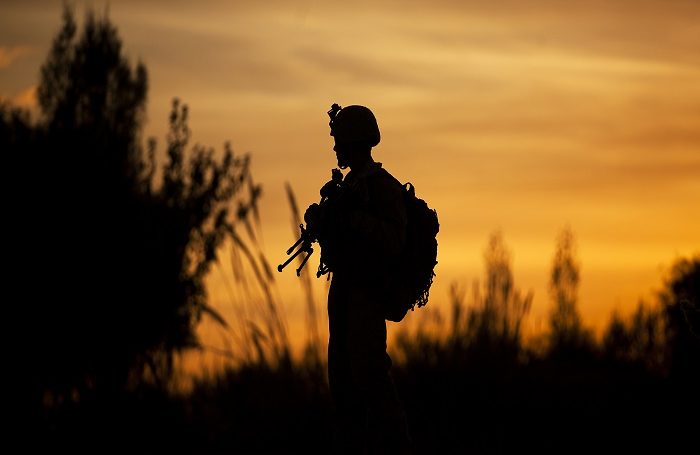
What will pull America home? Its forward deployed forces guard the frontiers of allies from their real or potential enemies on very stale arguments. US forces stand watch in the Baltic, maintain the peace in the Balkans, patrol the Black Sea, conduct freedom of seas cruises in the South China Sea, help chase IS in Iraq and Syria, fight the Taliban in Afghanistan, keep the sea lanes open in the Persian Gulf, and hold positions along the inter-Korea border.
Despite all of this, America is very secure country that lives far from trouble, protected by two big oceans and bordered by two non-threatening neighbors. The forward deployment is a legacy of the Cold War when the US was faced with a challenging Superpower and the need to protect its allies, once major powers in their own right, but then weaken greatly by the Second World War to the point of being near defenseless. The Cold War though has been over for nearly three decades. The allies are now as rich as Americans and more numerous. The Soviet Union no longer exists. The fact that America’s allies do not feel compelled to spend much on their own security means either that they see no serious threat to their security or that they feel comfortable free-riding on American protection. Likely both.
There are three reasons why Americans tolerate this strange burden. First, most Americans generally accept the lesson their leaders took from the Second World War that the US had to manage global security, that it could not just withdraw from power competitions because it will inevitably draw into them and likely at a disadvantage. America was late to the First World War and then failed to help enforce the peace that its president had been instrumental in crafting. The horrors of Second World War were the result. America has to manage conflicts far from its shores so as to prevent them from spiraling out of control and onto our shores. But is that true? Isn’t there an advantage of being behind allies instead of in front of them?
The second reason is that US has created a very large apparatus to do the managing, to create the military strength that backs it up, that was not significantly dismantled after the collapse of the Soviet Union. There was a reduction of only about a third in troop levels. Most of the global commands and monitoring systems remained at strength and in place, becoming a lobby for America’s continuing involvement in the management of regional problems. Europe faced the disintegration of the Soviet Union, ethnic cleansing in the Balkans, and the fears of a resurgent Russia on the part of former members of the Warsaw Pact. The Middle East was in chaos and the source of much terrorism. And China began both a rapid industrialization and a reawakening of its regional ambitions. There were threats and heart wrenching humanitarian crises everywhere. America, it was argued, had the experience and the responsibility to keep this all in bounds, allowing the world to remain on the path toward liberalism that the US had pioneered. Nearly three decades have passed.
Third, all of this managing and meddling it turns out does not cost much. There is little impingement of lives of average Americans. Conscription ended in 1974. The promise of adventure and post-service benefits brings in enough volunteers to fill the combat units. High wages bring in the rest. The burden on citizens is two or three percent of GDP and a few more potholes. Taxes go down, not up in modern American wars. Most of the needed money is borrowed. And as for the fighting, America has devised a system of long range sensors and precision guided weapons that keep our casualties down and limits collateral damage. It is all very distant.
What will change it all? Trump. Not the demands Trump has made that allies pay more of cost of their own defense. Not the fact that Trump rips up agreements on the environment or with Iran. No, just Trump himself. Allies’ public hate him. They are so appalled by his boastful manner, his insults, his deceit, his lack of knowledge and grace, his inarticulateness that they will riot when he visits their public squares. Such visits have been avoided to date but will eventually occur. When they do, the locals will burn American flags and happily insult Americans who elected Trump. They will ignore the pleas of their governments to show restraint. Latent anti-Americanism will be revealed. The contempt they hold for Americans will be demonstrated. And the third to half of America that supports Trump will turn totally against the security subsidy. The subsidy will unravel because combined with skepticism of US foreign policy on the Left there will no longer be sufficient domestic political support to provide it.
Further Reading on E-International Relations
- America First Revisited: Trump’s Agenda and Its Global Implications
- Creating and Mirroring Monsters: Trump’s America and Europe’s Role in It
- Opinion – Bad Omens for America after Liz Cheney’s Defeat
- Opinion – In a Knife-edge Election, Two Different Portrayals of America
- US Foreign Policy at a Crossroads: Trump’s ‘Donroe’ Doctrine
- Opinion – Re-election in Doubt: The Perfect Storm Approaches Donald Trump